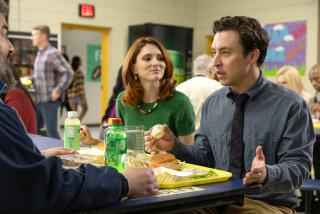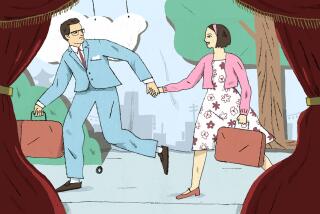Thanks, ‘Bevie’ : Retired Teacher Honored by Ex-Pupils Who Became Pals for Life
- Share via
The year was 1932 and Bill Jones was convinced he was a stupid kid. When he drew maps, they came out backward. When he read, the letters got garbled. Then eighth-grade teacher Florence Bevington got hold of him and realized the bright boy was merely dyslexic--although they didn’t have a fancy term for it back then.
Bill, who didn’t want his real name used because he is still embarrassed about his condition, credits Bevington with giving him the self-confidence to turn his life around. For years, the successful businessman, now retired, has wondered how to thank his former teacher from Park Avenue School in Alhambra.
On Saturday, Bill got his chance. He and and about 150 other of Bevington’s former students, many in their 60s and 70s, gathered at a Montebello restaurant to pay homage to the 86-year-old woman who was mentor, muse and surrogate mother to generations of students from 1926 until her retirement in 1959.
Although she never married or had children of her own, “Bevie,” as she is affectionately known, kept in touch with hundreds of her “boys and girls” over the years, sending hand-drawn and printed Christmas cards all over the United States and as far away as Germany and the Virgin Islands.
It was the Bevington network, keeping former pupils in touch with each other and the latest exploits of their irrepressible teacher. Bevington loves to travel and after her retirement would drive up the coast in her motor home to fish for salmon in Alaska, down to Mexico in search of mild winters, up into the Sierra for weeks of backpacking.
On Saturday, wearing aqua pants, a lacy white blouse and a silver turquoise belt found on one of her many trips, Bevington sat at the table of honor, radiating the same poise and disarming intelligence that many remembered from her days at the head of the class.
“I’m flabbergasted,” the teacher said, gazing with steady, blue eyes into into a sea of graying heads. “I had no idea there would be so many of you here today.”
One who came to see his former teacher was Charles Cook, who turned to Bevington for maternal support after his mother died when he was in grammar school.
Cook joined the British Royal Air Force as a fighter pilot in 1941, was shot down over Germany and interned as a prisoner of war. On Saturday, he told the group that Bevington’s letters provided succor and a familiar, wry tone that helped him keep sane during three years in Stalag Luft 3.
“You would love it here; it would remind you of Forest Lawn in Glendale,” Cook recalls writing to his eighth-grade teacher. “We have a lot of water to bathe--30 seconds every Friday afternoon.”
From her San Gabriel Valley home, Bevington wrote back: “I’m happy that you are enjoying the scenery and sure glad that you people are keeping so clean.”
“She knew how to handle the problem kids,” said Karl Stefek, whose twinkling eyes and conspiratorial tone makes one suspect that Stefek, class of ‘42, may have caused a bit of ruckus himself.
“She favored the boys, we were kind of mischievous, we boys got away with a little bit more but she knew how to handle the problem ones. She assigned them duties like running the projector. She understood them.”
Bevington says she won over the boys by playing baseball and basketball with them. Indeed, she was the athletic coach until the 1950s, instructing the 12- and 13-year-olds how to shoot hoops, whack a baseball out of the park and slide into home.
She also found time to take a group of Camp Fire Girls to Santa Catalina Island for a two-week camping trip. It was around the Fourth of July, and Daphne Plane, class of ‘34, recalls that Bevington played her ukulele as their ship steamed into Avalon Harbor. Then she took her young charges hiking over the mountains onto the far shore where she pointed out hulks of shipwrecked boats.
“She taught us to cook eggs on a hot stone. She was a trooper and she’s still trooping,” said Plane, who recently retired from Caltech, where she worked as geology librarian.
As the banquet ended, Bevington’s former students lined up five and six deep, their eyes shiny with memories, hands clutching faded class photos, reports assigned a half-century ago, puppets made of clay and papier-mache in Bevington’s famous art class, which students then used to perform plays assigned in English class.
“She knew how to keep idle hands and minds busy,” Stefek said. “Yes indeed. If there were more teachers like her, we wouldn’t have all these problems with young people today.”
More to Read
Sign up for Essential California
The most important California stories and recommendations in your inbox every morning.
You may occasionally receive promotional content from the Los Angeles Times.













